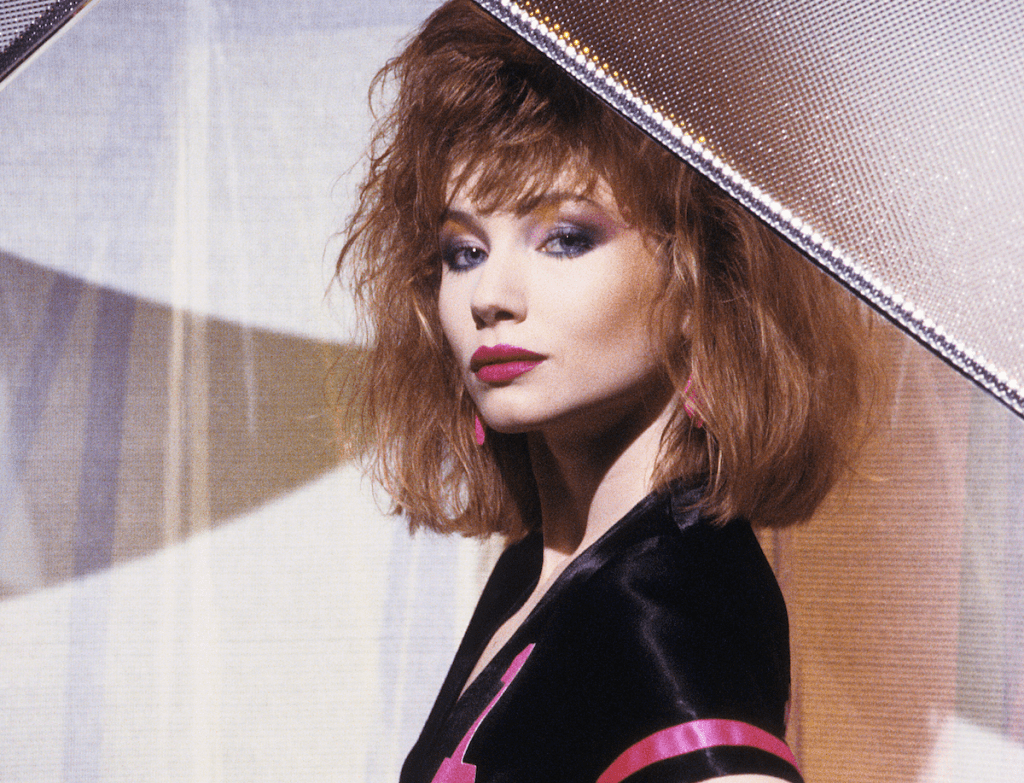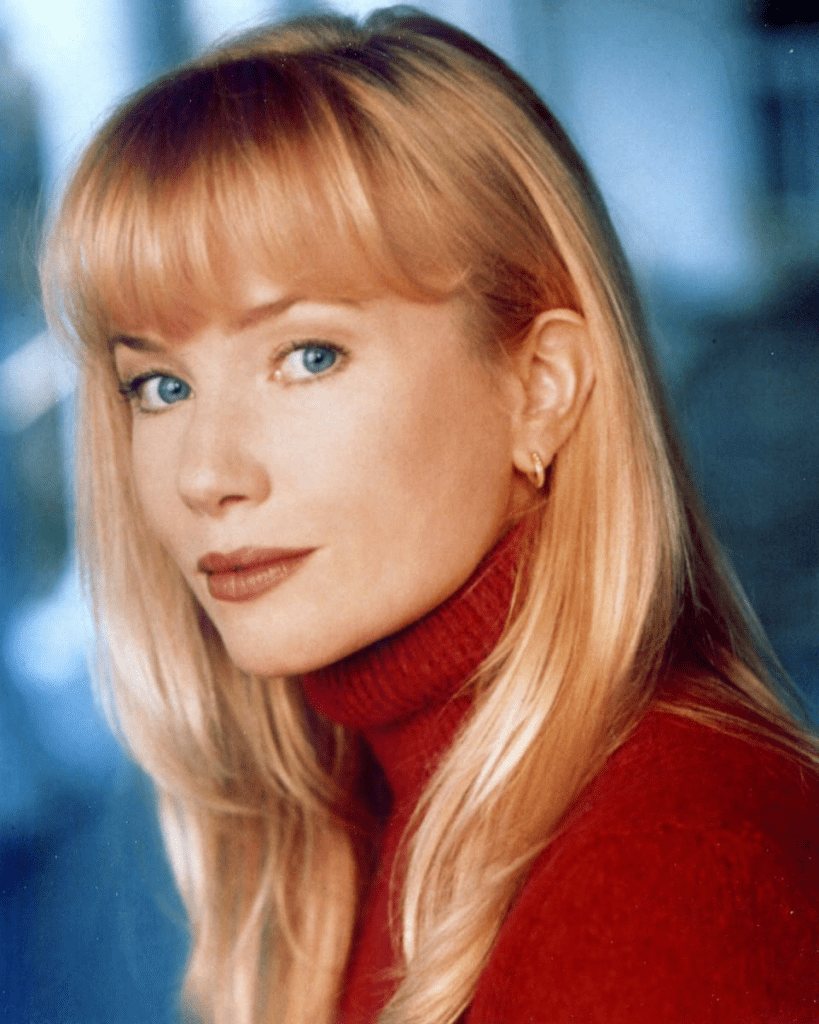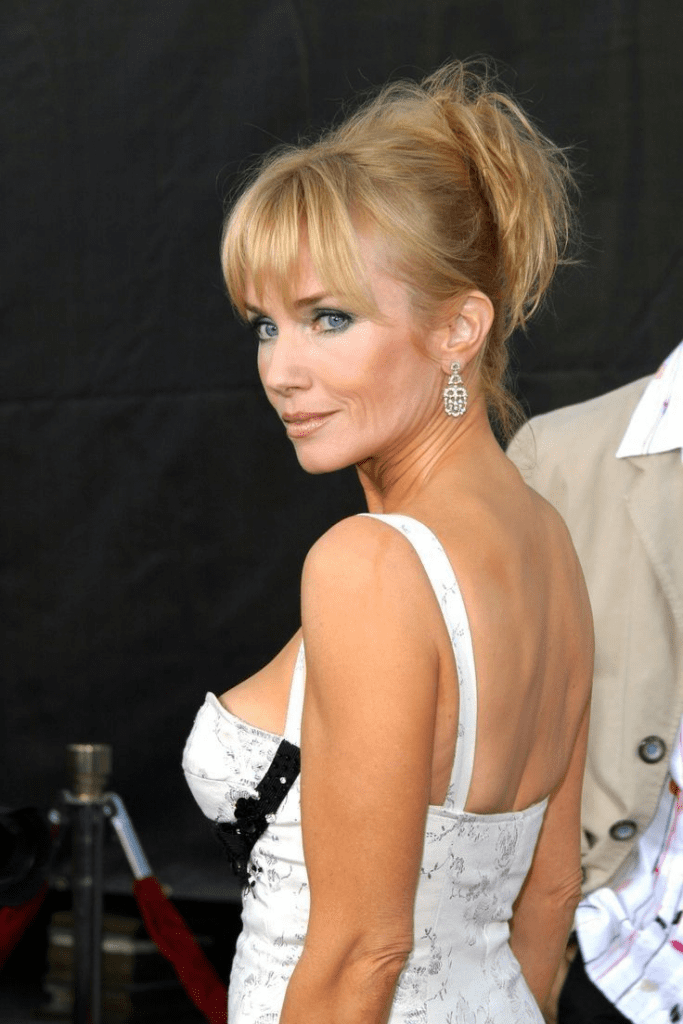The Woman Who Mastered Mystery, Beauty, and Power on Screen
Every once in a while, an actress comes along who doesn’t just play a role—she owns it. The kind of performer whose mere presence sends a ripple of energy across the screen, leaving audiences breathless long after the credits roll. That’s exactly what Rebecca De Mornay did—and continues to do—throughout her incredible career. At 65, she remains a captivating force, a living example of what happens when talent, intelligence, and timeless beauty collide.

From a Wild Childhood to a Dream in Motion
Rebecca De Mornay’s early life reads like the opening scene of a movie—unexpected, adventurous, and full of contrasts. Born on August 29, 1959, in Santa Rosa, California, her journey began amid the free-spirited chaos of the late ’60s. Her father, Wally George, was a controversial TV host; her mother, Julie Eager, an actress with wanderlust. When the marriage ended, Rebecca’s life turned into a road trip across continents—California, Europe, Canada—each move shaping her adaptability and resilience.

She attended school in both the U.S. and Europe before landing in New York City, where she studied acting at the prestigious Lee Strasberg Institute. “I didn’t have a stable home,” she once said, “but I had stories. I think that’s why I became an actress—to live them out loud.” That rootless youth gave her a depth few performers ever achieve—equal parts strength and vulnerability.
Video : Rebecca De Mornay S*xy
Rising Star: The 1980s and the Birth of a Screen Icon
Rebecca burst onto the Hollywood scene like a spark in dry timber. Her breakout came in Risky Business (1983), where she starred opposite a young Tom Cruise. The chemistry was electric, the confidence undeniable. She didn’t play the stereotypical “love interest”—she owned the camera. That famous train scene? Instantly iconic, forever etched into pop culture.

But Rebecca wasn’t interested in being typecast. Her next roles showed range beyond her years—intense dramas like Testament (1983) and Runaway Train (1985) proved she could handle weight, while The Trip to Bountiful (1985) added emotional grace to her résumé. By the mid-’80s, she’d become one of Hollywood’s most sought-after actresses—glamorous, sharp, and fiercely independent.
Peyton Flanders: The Villain Who Stole Our Sleep
Then came The Hand That Rocks the Cradle (1992)—a role that would forever define Rebecca De Mornay as the queen of psychological thrillers. As Peyton Flanders, she delivered a performance both chilling and hypnotic. Every smile carried menace; every glance promised chaos. Viewers couldn’t look away.

The film became a cultural phenomenon, grossing over $140 million and earning Rebecca critical acclaim for her haunting precision. “Peyton wasn’t evil,” she once explained. “She was broken—and I played her that way.” That nuance made the role unforgettable. She wasn’t just a villain; she was human, which somehow made her even scarier.
Beyond the Thrills: A Career of Depth and Diversity
While thrillers cemented her fame, Rebecca refused to stay in one lane. She explored every genre—crime dramas like Guilty as Sin (1993), romantic adventures like The Three Musketeers (1993), and indie films that let her flex creative control. She even stepped into the director’s chair, proving her artistry wasn’t confined to acting.

Her television work in the 2000s showcased yet another side of her. From ER to John from Cincinnati and Lucifer, she balanced strength and vulnerability with masterful ease. Each role carried her signature intelligence—never overdone, always captivating.
Behind the Scenes: Life, Love, and Lessons Learned
Rebecca’s personal life has been just as layered as her career. She famously dated Tom Cruise in the early ’80s—one of Hollywood’s most talked-about romances—and later had relationships with Harry Dean Stanton and musician Leonard Cohen, whose poetic soul deeply influenced her.

Marriage came in 1986 to writer Bruce Wagner, though it ended three years later. Her most meaningful chapter began when she met Patrick O’Neal, with whom she had two daughters, Veronica and Sophia. Motherhood became her grounding force. “It changes how you move through the world,” she said. “Everything slows down in the best way.”
She stepped back from Hollywood’s intensity to focus on family, only returning for roles that truly resonated. That choice wasn’t retreat—it was evolution.
Video : Here’s What Happened To Rebecca De Mornay
Awards, Accolades, and Artistic Respect
Throughout her decades-long career, Rebecca has received more than trophies—she’s earned enduring respect. From Saturn and MTV nominations for The Hand That Rocks the Cradle to recognition for her stage work and independent films, her name carries weight. Critics hail her for “mastering the art of emotional ambiguity”—a skill few can replicate.

In 2010, she received a Women in Film Crystal Award, honoring her contributions to storytelling and representation. But for Rebecca, the greatest reward has always been connection. “When someone says a role I played changed how they saw women, that’s the real win,” she said.

Timeless at 65: Where Rebecca De Mornay Stands Today
Now at 65, Rebecca De Mornay radiates the kind of beauty that comes from peace and purpose. She splits her time between Los Angeles and a quiet cabin in upstate New York, where she writes, mentors young actors, and occasionally steps back into the spotlight—on her terms.
Her recent projects blend elegance with edge, including producing independent films centered on strong female leads. She’s also passionate about supporting mental health and arts education, often lending her voice to causes close to her heart.

And yes, she’s still mesmerizing. Her natural grace, combined with the sharp glint of intelligence in her eyes, reminds the world that true glamour doesn’t fade—it evolves.
Conclusion: The Enduring Legacy of a Hollywood Original
Rebecca De Mornay isn’t just an actress—she’s an experience. Her characters linger, her performances echo, and her presence transforms every frame she graces. From the seductive confidence of Risky Business to the psychological brilliance of The Hand That Rocks the Cradle, she’s shown us every facet of what it means to be powerful, complex, and unapologetically human.

At 65, she stands as both muse and mentor, an artist who never chased fame but built a legacy that refuses to fade. Rebecca De Mornay remains proof that talent, like fine art, doesn’t age—it deepens, becoming more captivating with every passing year.